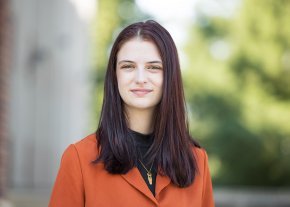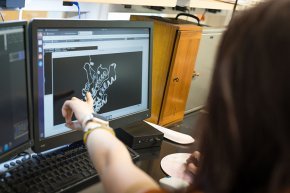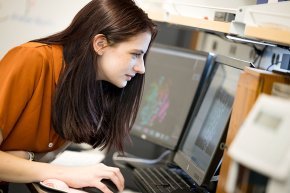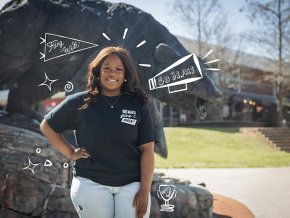
When computer science and chemistry collide
Advances in computer simulations and the abundance of large data sets in research are changing the way researchers define what a laboratory is, as chemistry major Reagan Womack ’24 discovered as part of the Molecular Interactions Virtual Research Experience for Undergraduates (MIVREU) this summer.

“We were using computational methods to look at 12 different proteins to learn what they are and what they do,” Womack explained. “Proteins are the central building block of pretty much everything, so they’re central to biochemistry. There are also so many of them, they’re a good subject for computational analysis.”
Womack has spent much of her time at LR investigating how chemistry and biochemistry can intersect with computer science and data analysis to advance research that is thorough in scope and precise in focus and results. As the only fully virtual research experience for undergraduates funded by the National Science Foundation, the MIVREU project is supervised by faculty from the University of Minnesota, Ithaca College and the State University of New York at Cortland. Student researchers hailed from universities all over the United States, including the University of California at Los Angeles, Oklahoma State University, and Clemson University.
While the general public may be more familiar with proteins in the context of nutrition, proteins are complex molecules that make up all living things, not just food. Some new proteins — such as those the MIVREU group studied — are discovered in isolation, sometimes through intentional discovery and sometimes as byproducts of other research.
“We knew we weren’t studying human proteins, but that was the extent of what we could be sure of,” Womack added. “Using several different programs, queries and online databases, we were able to simulate how different kinds of molecules would dock to the protein, predict how the molecule might change the protein and get us closer to identifying the protein and its purpose.”

Using the results of these simulations, researchers can compare their findings with the identified proteins cataloged across several online protein databases to find common traits, similar to the way a detective might run an unknown fingerprint through a crime database.
“Sometimes the databases are very accurate, sometimes not,” Womack shared. “Plus, any findings are still eventually verified through traditional lab analysis.”
Each member of the research team was assigned a different protein as the research focus, but her protein was reluctant to bond with any of the molecules that would lead to a clear idea of its type and function.
“I had 20 compounds bonded to my protein. Nineteen bound where I expected them to, but this one little compound decided to bind on the outside of the protein,” Womack said. “There’s no reason for it to do that because it’s going to get pulled off. But this is all interesting. It’s notable, and it’s forward progress.”
Now that the internship is complete, Womack is directing her full attention to her honors research, which employs many of the same methods.

“My honors research looks at prion proteins, which are proteins found in the brain that are prone to mutation. Those mutations cause neurodegenerative conditions such as Creutzfeldt-Jakob Disease in humans or scrapie in animals,” said Womack. “My focus uses predicted models to find a target on the protein that could be used to develop future treatments for neurodegenerative disease.”
Womack won a grant from the Appalachian College Association in the spring of 2023 to fund her honors project. She plans to continue exploring computational analysis in chemistry and biochemistry at the graduate level.
“It’s interesting how much my honors research and my summer research overlap because they’re both driven by computational analysis,” Womack commented. “This field of computational sciences and the study of proteins has so much potential, and there’s such a need for it. There’s a need for chemists, biochemists and biologists who have a proficiency in computer science.”

In this update, Rev. Dr. Chad Rimmer, rector and dean of Lutheran Theological Southern Seminary (LTSS), shares exciting developments as LTSS settles into its new home on the campus of Lenoir-Rhyne University.
View More
From the sports sidelines to the admission office, Zaniya Parks ’25 shows in her journey, the LR spirit isn’t just about game day—it’s about giving back.
View More